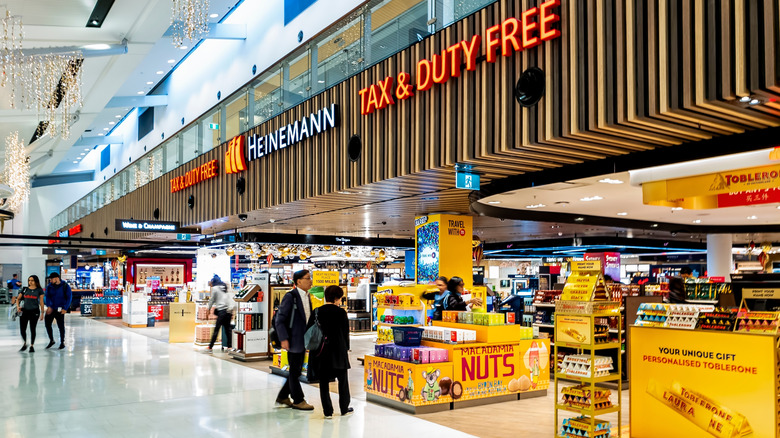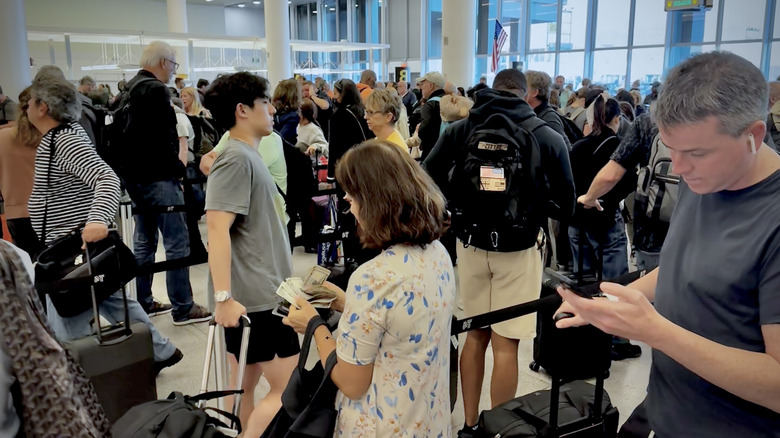
Often seen as a last-minute shopping haven, travelers flock to shops in the airport for reasons as diverse as saving money on luxury items to scoring duty-free retail bags (which is a sneaky hack for over-packers
to avoid luggage fees if your airline charges carry-ons by weight). But travel expert Rick Steves cautions readers on his website to be careful of what they purchase duty-free, particularly when shopping for perishables. "Because food items can carry diseases or pests, they are strictly regulated," he explains. "Just because a duty-free shop in an airport sells a food product, it doesn't mean it will automatically pass U.S. customs."
Duty-free shops are typically seen as places to save money, where premium goods can be purchased without the add-on of local and import taxes. But according to Steves, if shoppers aren't careful, they may wind up overpaying or "losing their investment." Oftentimes, duty-free items at airports have had their prices inflated, essentially negating any savings you may have benefited from by not paying taxes. Knowing how local prices for items like leather goods and liquor compare to those at the airport, or what the prices you might pay for the same items back home are, can help you decide whether you're actually getting a worthwhile deal or not.
But more specifically, Steves encourages travelers to watch out for items that are illegal to bring past the U.S. border when traveling from overseas. "Many processed and packaged foods are allowed, including vacuum-packed cheeses, dried herbs, jams, baked goods, candy, chocolate, oil, vinegar, condiments, and honey," he shares. However, most meats and fresh produce aren't.
Read more: Seemingly Normal Behaviors That TSA Will Watch You Like A Hawk For At The Airport
Rules For Smart Duty-Free Shopping, Per Rick Steves

Rick Steves has revealed that you can, in fact, claim a VAT refund on goods purchased outside the airport in Europe, essentially nixing the taxes on large purchases made overseas. However, many travelers still prefer duty-free shops for their convenience — especially when holding onto an excess of foreign bills at the end of a trip. Steves encourages passengers to verify customs rules and duty rates before taking them on the plane, though.
He shares the following limits to keep in mind while doing your airport shopping: Passengers can enter the U.S. with up to $800 of goods per person in their luggage, every 31 days. Of those goods, no more than one liter of alcohol may be included (which equates to a little more than a standard bottle of wine or a standard spirits bottle). Tobacco is limited to 200 cigarettes or 100 cigars. Household goods, clothing, and accessories for personal use have no limits, as long as they don't surpass a value of $800.
Ultimately, though, Steves says that the most important thing you can shop for while abroad are memories, or meaningful purchases that support local communities. "Don't let your trip become a glorified shopping spree," he advises on his website. Nor should you make the same mistake a young Steves once did: "I used to wait until the end of my trip to shop, then go hog wild," he remembers. Rather than saving all your shopping for duty-free shops at the airport and potentially wasting money or facing the consequences of tedious customs allowances, focus on souvenirs that are unique to the places you're visiting, especially those that are authentic, lightweight, and easy to pack.
Ready to discover more hidden gems and expert travel tips? Subscribe to our free newsletter for access to the world's best-kept travel secrets.
Read the original article on Islands.













